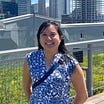My Asian Identity Has Been Giving Me Writer's Block
I've never been sure about my place in the world of fiction.
I'm an editor by trade, and that's where my talents lie. My superpower is my ability to polish any piece of writing until it shines, and I've been making a living off that gift for years now. But any editor will tell you that they're also a writer at heart – and I'm no different.
One of my brightest childhood memories is of entering a writing contest run by Bruce Coville, author of the popular My Teacher is an Alien series. He put out a call for elementary school-aged children to submit their scary short stories, promising to publish the winning entry as a part of his upcoming anthology. I spent a few hours composing a story about a haunted elevator that never lets you off and dashed it off that same day in a manila envelope.
Months later, I received a letter from Bruce Coville himself, awarding me third place in his contest. He included a personal check for $50 as a prize and told me to keep writing. My story wouldn’t be published, but I was thrilled to have been acknowledged by a bona fide author whose books I loved. I never did let my mother deposit that check for me; I wanted to keep it forever.
Since that foray into fiction writing at the age of 10, I haven't completed another story of note. It wasn't for lack of effort. I continued to start new pieces, jot down plot points, emulate my favorite authors. In college, I took a creative writing course and produced a few short stories, but they weren't anything I was proud of, and I honestly can't even remember what they were about. As a journalism major, I took a lot of other writing courses: feature stories, reporting, personal essays. I wrote a weekly op-ed column for the NYU newspaper. I did plenty of writing – and discovered I was a natural at editing – but fiction, as it turned out, wasn't really my thing.
I never consciously questioned why this might be. After graduating, I was able to make a living as a copy editor and also got paid to write all sorts of things on the side – magazine features, how-to articles, blog posts, ad copy, even wine labels. When I'm writing a personal essay like this one, the words will pour out of me faster than I can type. But when it comes to writing fiction, I’m often left staring at a blank doc.
I chalked it up to lack of imagination. But more recently I've come upon a new realization: All this time, I haven't known whose story I should tell – because I wasn’t sure about my own place in the world of fiction as an Asian-American.
For most of my life, the category of “books written by first-generation Asian-American authors” has been basically nonexistent. For the mainstream reader, there was Amy Tan and that was about it. It wasn't until later that others began to appear on the scene. It was a revelation when I discovered Jhumpa Lahiri, and she remains one of my favorite authors to date – yes, because her prose is elegant and luminous, but also because for the first time ever, I was connecting with fictional characters like The Namesake’s Ganguli family on a level I didn’t know I was missing and longing for. Their immigrant story mirrored my own life, resonating with me deeply.
It wasn't until recently, however, that I noticed a sea change occurring. The number of Asian surnames on bylines has multiplied in the past five years – I marvel each time I see one at the library. Ruth Ozeki. Celeste Ng. Ted Chiang. Min Jin Lee. Susie Yang. My middle school-aged daughter is reading books by Grace Lin, Kelly Yang, and Marie Lu. No one ever said it wasn't possible for someone like me to write fiction, but now I realize I had no models to follow while I was growing up. Nonfiction came easy for me because I got to write as myself. Fiction was much harder; I didn’t know who I should be writing as.
Each time I sat down to think through a story, I'd be stalled by the lack of a clear picture of the main character. Would my protagonist have to be of Taiwanese descent, as I am? If she weren’t, would the story be inauthentic, coming from me? If she were, would the story have to be all about her identity and how it defines her? I was completely blocked by my inability to answer these questions. (I know it's fiction and can theoretically be completely fabricated, but even made-up stories will feature autobiographical elements.) I wasn’t consciously forming these questions – they were whispers in the recesses of my mind. If you’d asked me to articulate the problem, I don’t think I’d have been able to.
And even if I were to tackle these questions and figure out a path forward, I wasn't convinced that a mainstream American audience would want to read a story with an Asian protagonist, or a protagonist of another race written by an Asian author. Now it's become clear that at this point in time, Americans have an appetite for stories of all kinds, which is truly amazing. On the memoir front, there are even more Asian-American writers who are being embraced, like Jay Caspian Kang, Michelle Zauner, and Stephanie Foo, to name just a few. It's simply not something I could imagine 10 years ago, or even five years ago. Sort of like how before the #MeToo movement, it was hard to picture a world where women wouldn't always be openly diminished as sexual objects in every space from the workplace to the movie screen.
I'm now also realizing that I'm free to write any kind of story I want. It could involve cultural identity … but it also could not. I recently devoured the popular book Tomorrow and Tomorrow and Tomorrow by Gabrielle Zevin (who is half-Korean), and while the story is stunning on so many levels, what astounded me the most was that some of the main characters were of Asian descent, yet their cultural identity wasn't the main point of the story. These characters weren't defined by their Asianness; they were simply allowed to be themselves. What a concept!
All this to say that with so many great examples out there now that are being embraced, I'm finally feeling comfortable with the idea of writing fiction. I don't know if I'll ever actually rise to the occasion and come up with a story worth reading, but I'm at least excited now to give it a try. My main character can be whoever she wants to be, and I can’t wait to tell her story.
An abbreviated version of this issue first appeared in Publishers Weekly.







What a powerful article Nancy! You are so talented and I can't wait to read your stories!
I think you hit on something crucial here: reading books with characters we can identify with from a young age is so important. I'm glad things are changing in publishing to represent that, as your school age child is finding.
Interesting and thought provoking piece, thank you!